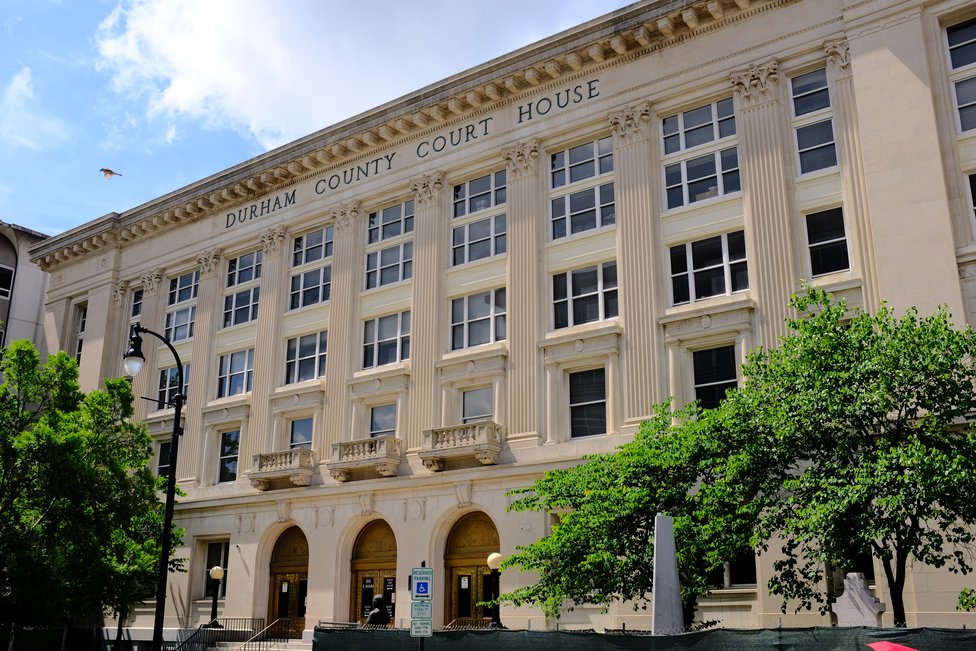Durham County Courthouse in Durham, North Carolina
Laurie and I like riding our Gold Wing motorcycle. But it is easy to get into a rut and just ride the same roads. So to force ourselves to ride to places we would not normally visit we made a goal to visit and photograph all 100 North Carolina courthouses within 1 year.
As usual, we got a little behind. We started in July 2015 and finished 99 out of 100 by June 2018. The last courthouse was in our home county of Wake and it took us until Feb 2021 to get that final one. But we made it! This blog is about one of those visits.
Many NC courthouses were added to the National Register of Historic Places in 1979. The nomination form has some interesting facts about the various courthouse styles over the years.
Courthouse Information
I could find no historical information about this courthouse.
County Information
The North Carolina History Project lists the following information for this county:
The Occaneechi and Eno were the first residents of present-day Durham County. Different from the Iroquois and Tuscarora, the peaceful Occaneechi migrated to Virginia as European settlers settled the area in the mid-eighteenth century. The Eno lived on the eastern side of Durham, and John Lawson encountered the tribe upon his survey of early North Carolina. Like the Occaneechi, the Eno moved with the Catawba tribe to live in South Carolina as the white man moved into the region.
German, English, and Scotch-Irish settlers were the first Europeans to inhabit Durham. Most of the families who sought to dwell in Durham received land grants from the Earl of Granville, the Lord Proprietor of the Carolinas.
The city of Durham formed before Durham County was established. Dr. Bartlett Durham, a landholder, offered the North Carolina Railroad Company his land as a station point for the new railroad. In 1854 the railroad was completed, and the area was named Durhamville, in honor of Dr. Durham. The name was shortened to Durham several months later. The town was incorporated in 1869, and the county was established by the state legislature in 1881. Bahama and Rougemont are other communities within the county, and Chapel Hill spills over into parts of Durham.
After the Civil War, the tobacco industry dominated the city's economy. Cameron, Hardscrabble, and Leigh were the largest plantations within Durham in the early and middle nineteenth century. Yet, once the War Between the States concluded, the plantations vanished. Both black and white farmers searched for an easy crop to grow and they found tobacco to be the answer. In 1871, Winston-Salem was the first city to start a tobacco factory, but several years later Washington Duke, along with his two sons, established the W. Duke Sons and Company in Durham.
Washington Duke lost his farm after the Civil War, but he decided to try his luck in the burgeoning tobacco industry. Duke's first factory in Winston was a 20 x 30 foot log cabin that produced nearly 500 pounds of tobacco a day in the 1860s. After moving the company into a Durham factory, Washington provided a good foundation for his progeny. Several years later, James B. Duke, Washington's son, expanded the company throughout the nation. James, along with James Bonsack, developed a small machine that rolled and manufactured cigarettes easier and at a much cheaper cost. The invention, along with a new immigrant labor workforce, boosted company profits, and in 1890, the W. Duke Sons and Company joined with several other tobacco businesses to form the American Tobacco Company.
Although the American Tobacco Company no longer exists in Durham, the city and county saw great economic growth spurred by the innovation of the African-American population. During the early 1900s, Durham was known as the "Black Wall Street", thanks in part to entrepreneur Charles Spaulding. In addition, numerous businesses opened in downtown Durham in the Parrish Street area. In 1899, North Carolina Mutual Life Insurance Company opened in Durham; it was the first African-American insurance company, and it has since become a nationally renowned corporation.
Presently, Durham County continues to boast in its economic productivity and thriving medical institutions. The Research Triangle Park, a central hub for businesses, research organizations, and other innovative companies, stretches into northern Wake County and southern Durham County. Duke Hospital, along with other healthcare facilities, have long established the city of Durham as a leading medical provider to the state and the entire nation.
Durham is home to Duke University, North Carolina Central University, several historical sites, and cultural institutions. One of the top academic institutions in the United States, Duke University was originally called Trinity College and was located in Randolph County. It moved to Durham in 1887 at the request of Washington Duke, a key benefactor. In 1924, after James Duke's $40 million donation, Trinity College was renamed Duke University. North Carolina Central University, founded by Dr. James E. Shepard in 1910, was the first African-American liberal arts college in the country.
The Duke Homestead, the Stagville Plantation (1857), Durham's Carolina Theatre, and West Point on the Eno (a 400-acre park) are all historic sites in Durham. In addition, the Bennett Place, a farmhouse in the region, was the site of surrender by Confederate General Joseph Johnston to Union General William T. Sherman. On April 26, 1865, Johnston and Sherman signed papers that turned out to be the Civil War's largest military surrender. Some cultural institutions include the Durham Symphony, the Durham Arts Council, the Duke Art Museum, the Hayti Heritage Center, and the N.C. Museum of Life and Science.
Our Experience
We did not get to this courthouse before the confederate statue was destroyed by demonstrators on August 14, 2017. Only the base remains.
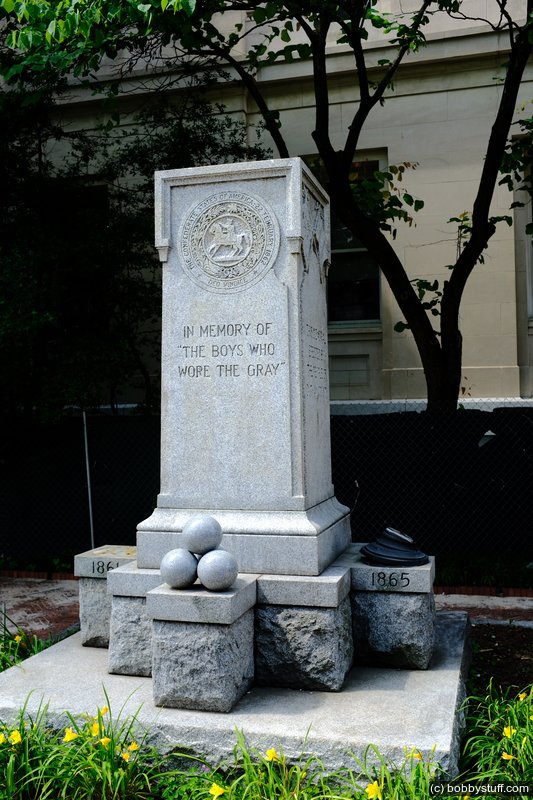
Durham County Courthouse in Durham, North Carolina
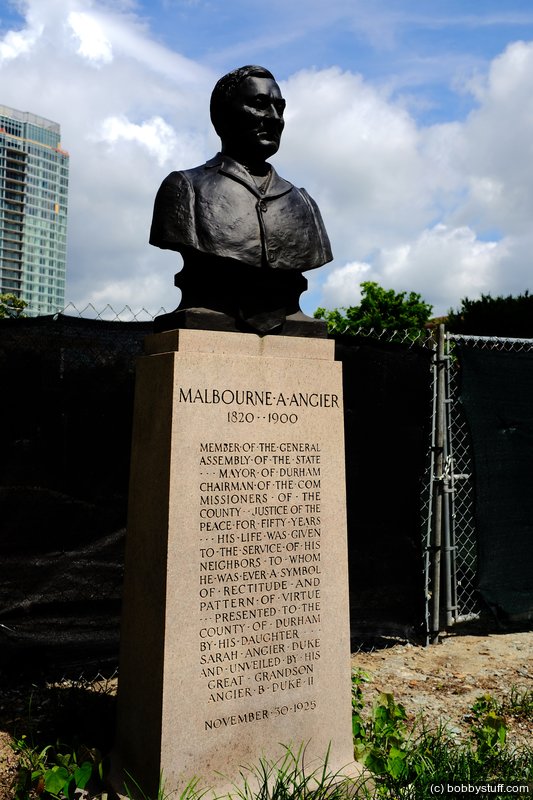
Durham County Courthouse in Durham, North Carolina
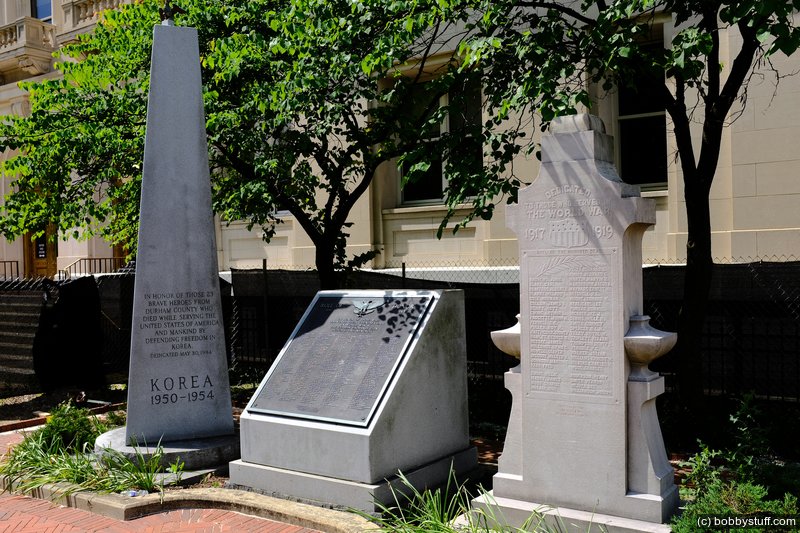
Durham County Courthouse in Durham, North Carolina
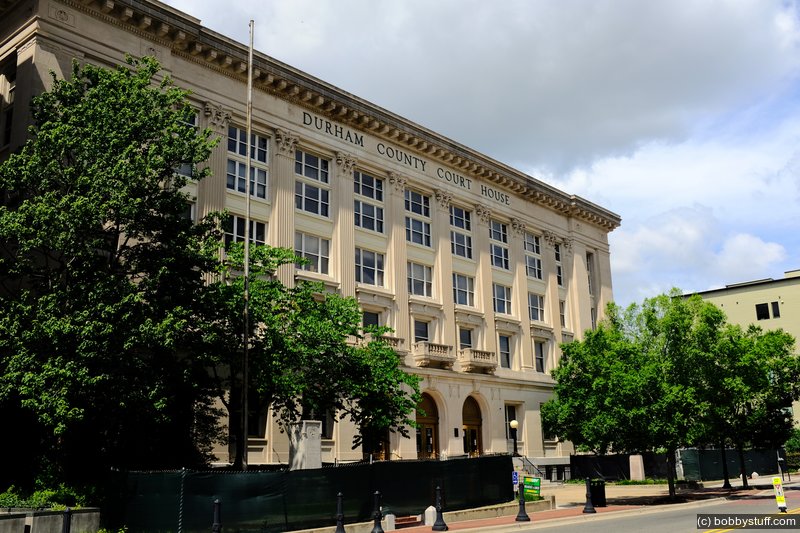
Durham County Courthouse in Durham, North Carolina
